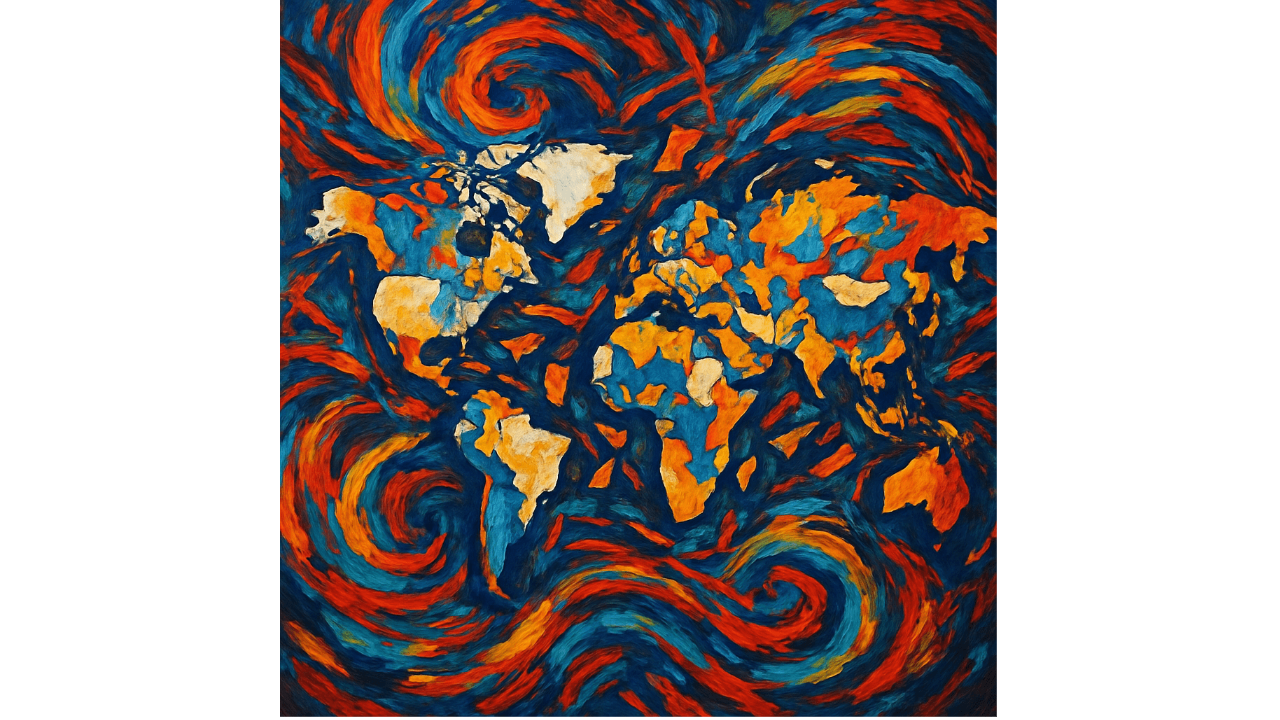By Robbin Laird
World leaders find themselves lurching from crisis to crisis with little time to catch their breath. This reactive scramble has become the defining characteristic of our era or what might be called the “anarchy of the moment.”
Unlike the grand ideological struggles or systematic breakdowns that marked previous periods of global disorder, today’s chaos feels fundamentally different. It’s not driven solely by competing visions of world order or the collapse of established systems, but rather by an endless succession of urgent, interconnected crises that demand immediate responses. Each moment brings its own emergency, its own imperative for action, leaving little room for the kind of strategic thinking that once shaped international relations.
The Speed of Everything
The anarchy of the moment is born from velocity. Information travels instantly, markets react in milliseconds, and social movements can mobilize millions within hours. When a single tweet can trigger a diplomatic incident or a supply chain disruption in one region can cause shortages halfway around the world within days, the traditional tools of governance, deliberation, consultation, careful planning, begin to feel obsolete.
Consider how recent global events have unfolded. Conflicts that might once have simmered for months before drawing international attention now explode into global consciousness within hours, complete with real-time footage, competing narratives, and immediate demands for action from world leaders. Economic disruptions that previous generations might have had weeks to analyze and respond to now require emergency measures implemented over weekends.
This compression of time has fundamentally altered the nature of leadership and decision-making. Rather than chess masters contemplating long-term strategy, today’s leaders increasingly resemble emergency room doctors, triaging an endless stream of urgent cases while trying to keep the patient alive.
The Ubiquity of Crisis
What makes this anarchy particularly disorienting is its ubiquitous character. In previous eras, global disorder often emanated from great powers or major institutions. Today’s chaos emerges from everywhere and anywhere, a single individual with a smartphone can trigger international incidents, small-scale cyber attacks can cascade into major disruptions, and local environmental disasters quickly become global concerns.
This ubiquitous of crisis means that traditional hierarchies and channels of influence are constantly being bypassed. A teenager’s climate activism can reshape international negotiations. A regional bank’s collapse can threaten global financial stability. A local conflict can draw in major powers through the magnetic pull of social media attention and public pressure.
The result is a world where the next major disruption is as likely to come from an unexpected corner as from the usual suspects, making prediction and preparation extraordinarily difficult.
The Paradox of Connectivity
Ironically, the very systems designed to bring order and efficiency to our interconnected world have amplified the anarchy of the moment. Global supply chains that optimize for efficiency prove brittle when disrupted. Financial systems that enable instant capital flows also enable instant contagion. Communication networks that allow unprecedented coordination also facilitate the rapid spread of misinformation and panic.
Our interconnectedness means that local disturbances rarely remain local, while our real-time awareness of these cascading effects creates a constant sense of crisis. We are simultaneously more informed about global events than any previous generation and less able to process that information in ways that lead to coherent action.
Living in the Eternal Present
Perhaps most fundamentally, the anarchy of the moment reflects a collapse of temporal perspective. When every crisis is immediate and urgent, the distinction between important and unimportant, lasting and temporary, becomes difficult to maintain. Long-term challenges compete for attention with daily emergencies, often losing out to whatever is most visceral and immediate.
This creates a kind of political and social attention deficit disorder, where societies careen from one focus to another without ever developing the sustained attention necessary for addressing complex, systemic problems. The urgent consistently drives out the important.
The Search for Pattern
Yet even within this apparent chaos, patterns persist. The anarchy of the moment may feel random and unpredictable, but it unfolds within existing structures of power, wealth, and influence. Some actors are better positioned to exploit the chaos than others. Some institutions prove more resilient than expected. Some problems, despite being urgent, never quite rise to the level of demanding immediate action.
Understanding these underlying currents or the persistent forces that shape how moments of anarchy unfold may be key to navigating this new reality. Rather than trying to eliminate the chaos or return to some imagined era of stability, perhaps the task is learning to operate effectively within it.
The challenge is in effect chaos management.
The anarchy of the moment may be the defining condition of our interconnected age. The question is not whether we can restore order in the traditional sense, but whether we can develop new forms of adaptability, resilience, and wisdom that allow us to thrive amid the constant churn of urgent demands and immediate crises.
In a world where the next moment might bring anything, the premium is no longer on predicting the future but on cultivating the capacity to respond thoughtfully when that unpredictable future arrives.
By some sort of cosmic accident, my dissertation at Columbia University was entitled: “On Historical Change: Order Within Chaos.”
But then again, I took a two-year course when an undergraduate on something called “symbolic logic” and no one including myself understood why I was doing so. I would like to say authoritatively that I was anticipating AI but of course that would be something only a politician could claim concerning personal foresight.
Note: After working on shaping a special report on Pasquale Preziosa’s recent articles, I began to work on this article.
The New Global Power Equation: A Special Report Based on the Work of Pasquale Preziosa


